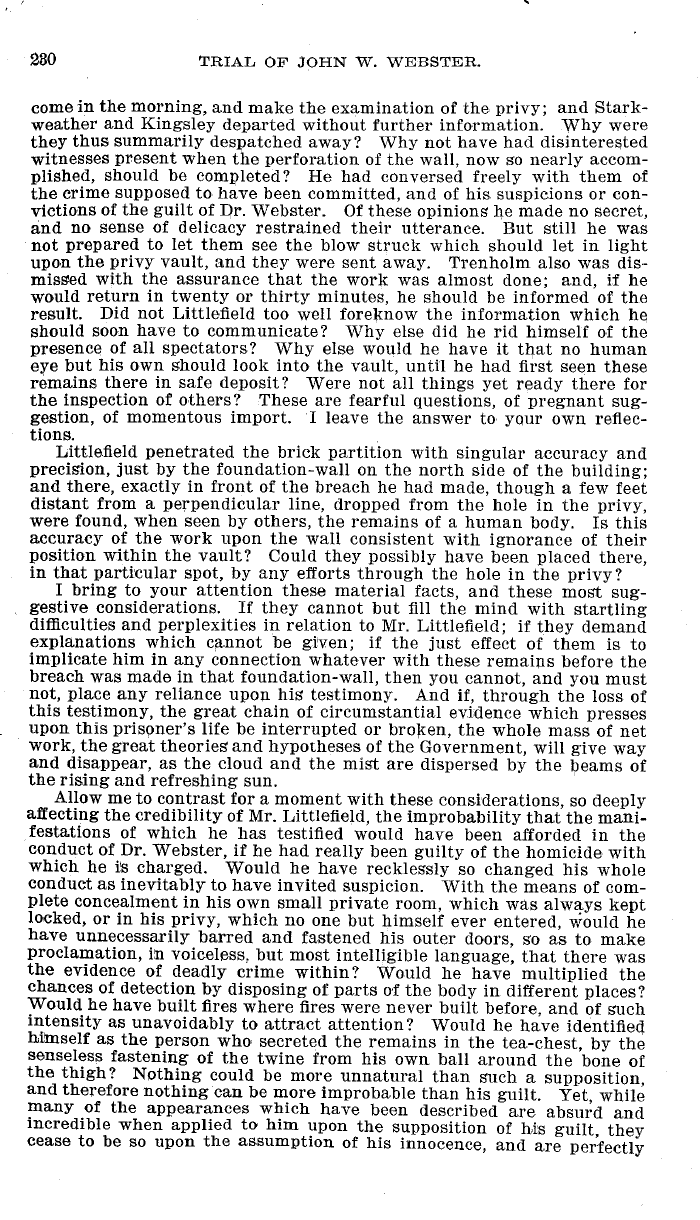|
280 TRIAL OF JOHN W. WEBSTER.
come in the morning, and make the examination of the privy; and Stark-
weather and Kingsley departed without further information. Why were
they thus summarily despatched away? Why not have had disinterested
witnesses present when the perforation of the wall, now go nearly accom-
plished, should be completed? He had conversed freely with them of
the crime supposed to have been committed, and of his, suspicions or con-
victions of the guilt of Dr. Webster. Of these opinions he made no secret,
and no sense of delicacy restrained their utterance. But still he was
not prepared to let them see the blow struck which should let in light
upon the privy vault, and they were sent away. Trenholm also was dis-
missed with the assurance that the work was almost done; and, if he
would return in twenty or thirty minutes, he should be informed of the
result. Did not Littlefield too well foreknow the information which he
should soon have to communicate? Why else did he rid himself of the
presence of all spectators? Why else would he have it that no human
eye but his own should look into the vault, until he had first seen these
remains there in safe deposit? Were not all things yet ready there for
the inspection of others? These are fearful questions, of pregnant sug-
gestion, of momentous import. I leave the answer to your own reflec-
tions.
Littlefield penetrated the brick partition with singular accuracy and
precision, just by the foundation-wall on the north side of the building;
and there, exactly in front of the breach he had made, though a few feet
distant from a perpendicular line, dropped from the hole in the privy,
were found, when seen by others, the remains of a human body. Is this
accuracy of the work upon the wall consistent with ignorance of their
position within the vault? Could they possibly have been placed there,
in that particular spot, by any efforts through the hole in the privy?
I bring to your attention these material facts, and these most sug-
gestive considerations. If they cannot but fill the mind with startling
difficulties and perplexities in relation to Mr. Littlefield; if they demand
explanations which cannot be given; if the just effect of them is to
implicate him in any connection whatever with these remains before the
breach was made in that foundation-wall, then you cannot, and you must
not, place any reliance upon his testimony. And if, through the loss of
this testimony, the great chain of circumstantial evidence which presses
upon this prisoner's life be interrupted or broken, the whole mass of net
work, the great theories and hypotheses of the Government, will give way
and disappear, as the cloud and the mist are dispersed by the beams of
the rising and refreshing sun.
Allow me to contrast for a moment with these considerations, so deeply
affecting the credibility of Mr. Littlefield, the improbability that the
mani-
festations of which he has testified would have been afforded in the
conduct of Dr. Webster, if he had really been guilty of the homicide with
which he is charged. Would he have recklessly so changed his whole
conduct as inevitably to have invited suspicion. With the means of com-
plete concealment in his own small private room, which was always kept
locked, or in his privy, which no one but himself ever entered, would he
have unnecessarily barred and fastened his outer doors, so as to make
proclamation, in voiceless, but most intelligible language, that there was
the evidence of deadly crime within? Would he have multiplied the
chances of detection by disposing of parts of the body in different places?
Would he have built fires where fires were never built before, and of such
intensity as unavoidably to attract attention? Would he have identified
himself as the person who secreted the remains in the tea-chest, by the
senseless fastening of the twine from his own ball around the bone of
the thigh? Nothing could be more unnatural than such a supposition,
and therefore nothing can be more improbable than his guilt. Yet, while
many of the appearances which have been described are absurd and
incredible when applied to him upon the supposition of his guilt, they
cease to be so upon the assumption of his innocence, and are perfectly
|

